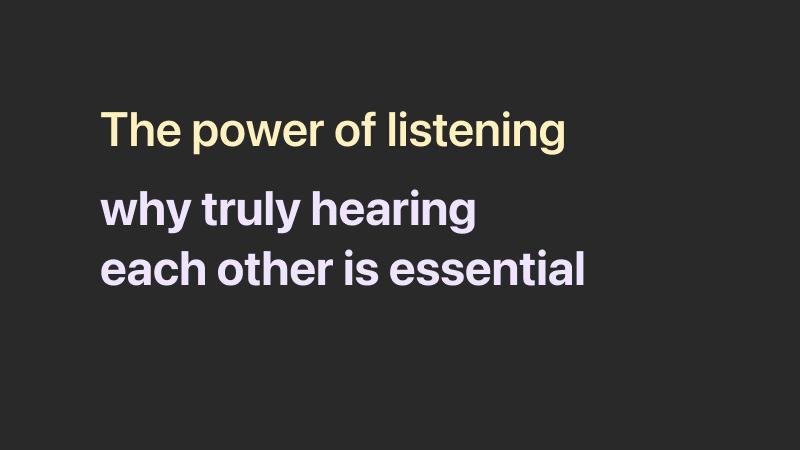In the hustle and bustle of daily life, it’s easy to let our conversations become superficial exchanges of words. However, truly listening to each other in relationships is a cornerstone of deep, meaningful connections. This means not just waiting for your turn to speak but genuinely trying to understand your partner's perspective, even when it challenges your own beliefs. Here’s why listening is crucial and how it can transform your relationship.
Building Trust and Respect
Listening is a profound act of respect. When you truly listen to your partner, you’re showing them that their thoughts and feelings matter to you. This fosters a sense of trust, making your partner feel valued and understood. Over time, this mutual respect and trust become the foundation of a strong and resilient relationship.
Enhancing Emotional Intimacy
Emotional intimacy is built on understanding and empathy. By actively listening, you can better comprehend your partner’s needs, fears, and desires. This deeper understanding allows you to support each other more effectively, strengthening your emotional bond. Sharing these intimate moments can bring you closer and help you navigate life’s challenges together.
Preventing Misunderstandings
Many conflicts in relationships arise from misunderstandings. When you listen attentively, you can catch the nuances in your partner’s words, reducing the likelihood of misinterpretation. By clarifying points and asking questions, you ensure that both of you are on the same page. This proactive approach to communication can prevent many arguments and foster a more harmonious relationship.
Fostering Growth and Change
Listening with an open mind allows you to consider your partner’s perspective, even when it differs from your own. This can be a powerful catalyst for personal growth and change. When you acknowledge the validity of your partner’s experiences and feelings, you create an environment where both of you can evolve. This mutual growth strengthens the relationship and helps you both become better versions of yourselves.
Strengthening Problem-Solving Skills
Effective listening is essential for collaborative problem-solving. When both partners feel heard and understood, they are more likely to work together to find solutions. This collaborative approach not only resolves issues more effectively but also reinforces your partnership. Facing challenges as a team can strengthen your bond and build a sense of solidarity.
Creating a Safe Space
A relationship where both partners feel heard and understood is a safe haven. Knowing that your partner will listen without judgment creates a space where you can be your true self. This sense of safety encourages open and honest communication, essential for addressing deeper issues and maintaining a healthy relationship.
Conclusion
In relationships, listening is more than just hearing words—it’s about understanding and validating your partner’s experiences and feelings. By making a conscious effort to listen actively, you show respect, build trust, and deepen emotional intimacy. This practice can prevent misunderstandings, foster personal growth, enhance problem-solving, and create a safe space for honest communication. Embracing the power of listening can transform your relationship, making it stronger and more fulfilling. So, next time your partner speaks, truly listen—you might discover a whole new side to them and enrich your connection in ways you never imagined.




